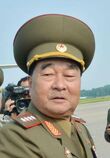|
Imperial People's Party | |
|---|---|
| Information | |
| Founded | 10 June 3874 |
| Defunct | July 4011 |
| Headquarters | F28, Pyeonghwa Tower Seongtaek |
| Ideology | Monarchism Nationalism Organic Democracy Populism |
| Political Position | Right-Wing |
| Websites | www.inmin.go.dr |
The Imperial People's Party (Kyo: 제국인민당, Jeguk-inmindang; Dra: Partido Popular del Imperio; Abbr: IPP) was an authoritarian monarchist political party in the Great Kyo Empire. The party served as the vanguard of the Imperial House of Ryeo and it commanded near total authority over the government.
While Dankuk was, in practice, a one-party state, the Imperial People's Party was the leading organization of the Imperial United Front. This popular front allowed for the existence of other political parties and permitted them to operate freely so long as they committed their loyalty to the Empire and the central leadership role of the IPP in government.
Party Leadership[]
The figurehead of the Imperial People's Party was the Emperor. Under this structure the Emperor was politically active and fulfilled the role of President of Dankuk. In effect it made Dankuk a de facto absolute monarchy. The Emperor commanded significant influence over the party, though he worked closely with the internally elected Party Chairman. Within the government, the Party Chairman was usually appointed as Vice President.
Over time there emerged two factions within the party, reformists and conservatives. The reformists sought greater democracy within the party and the nation. The conservatives wanted to uphold the status quo and protect the central authority of the party leaders in governance. Often governments would shift back and forth between reformist and conservative control, often with the Imperial Household moderating internal party conflicts.
In the early 4000s, under a reformist-majority cabinet, led by Emperor Seojun and Vice President Dan Seong, the first ever political party, other than the IPP, was permitted to join the Imperial United Front. This immediately splintered the party and hard-line conservatives, led by General Choi Youngsoo, forced through the formation of a new government. The Imperial Household attempted to reduce the radicalism of the government by increasing its presence in the cabinet, but it was not enough. The new party, the National Democratic Congress (NDC), won in a landslide in the 4011 elections and it immediately refused to recognize the supremacy of the IPP, as required by the Imperial United Front's administrative laws. The Imperial Household accepted the legitimacy of the NDC's election results and its right to form government, effectively abandoning the IPP and Choi Youngsoo.
Vice President Choi and his loyalists refused to step down, and as the NDC moved forward with forming a government, Choi launched a coup, occupying numerous government offices in Seongtaek. He also attempted to occupy Beonyeongsalm Palace in Gongmangdo, but his forces were fought off by the Ryeo Imperial Guard. The coup lasted for roughly a week and resulted in the assassination of Emperor Seojun, Crown Prince Choesun, and of the the NDC leader. However, the coup did ultimately fail and the the Imperial People's Army eventually restored order in Seongtaek. Many reformists had already abandoned the IPP after Choi's takeover, and once Choi targeted the monarchy, he also lost a large number of conservative supporters as well. As all these events occurred, the IPP effectively collapsed.



